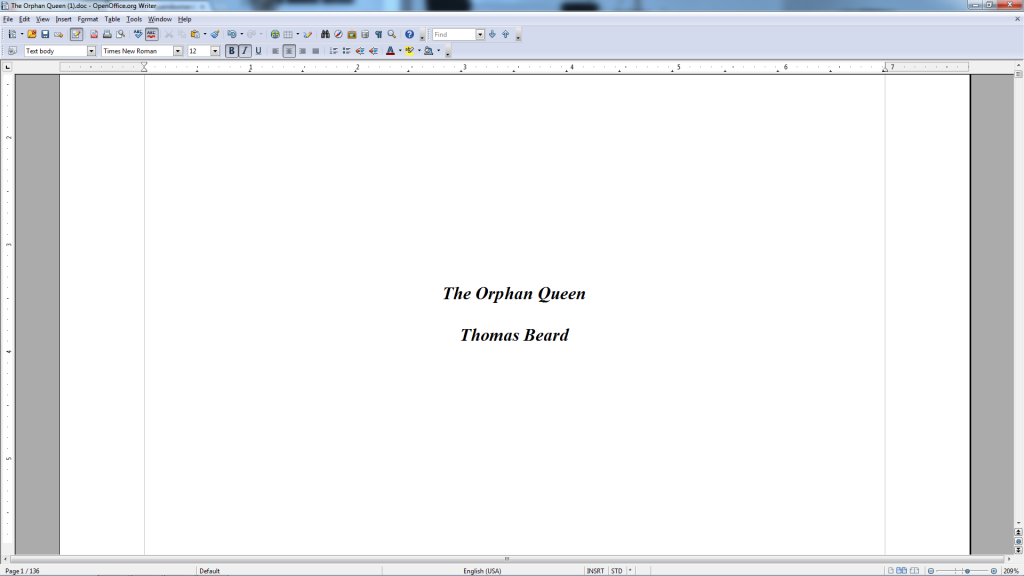 If everything goes as planned, my first novel, a fantasy, will be published by the Consortium later this year. I’ve been working on it for nearly six years. I think it’s ready.
If everything goes as planned, my first novel, a fantasy, will be published by the Consortium later this year. I’ve been working on it for nearly six years. I think it’s ready.
You should have seen the first draft I wrote back in 2007. It was, in a word, awful. The main character was pathetic, his love interest was impossibly perfect, one of the side characters ended up being the hero, the core theme wasn’t really introduced until just over halfway through, and I spent a lot of time explaining away plot holes that I wouldn’t have had in the first place had I engaged in any actual world building.
In fact, I really only had one thing going for me. I had learned the value of rewriting.
When I first started writing as a hobby, I was vaguely aware that I was supposed to rewrite my material and make it better. I knew what editors were for. But I grew so attached to every specific character, plot point, and turn of phrase that I couldn’t bring myself to part with them. I had written those early stories in such an emotional pique that it felt like betraying myself to change them.
Fast-forward to The Last Prince, the working title of the first draft of my novel. By then I had some practice at rewriting, and I knew that my book would need work, but I thought that most of my effort was behind me.
So I gave it to three people I trust to tell me the truth even if it hurts: my wife, my sister-in-law, and my father. The feedback was unanimous. I had a long way to go.
In my first set of rewrites, I actually did very little. I hoped that my issues were mostly on the surface. I was wrong. The story was such a mess, I had to put it away. And so it gathered dust for many, many months.
I was still busy in the meantime. I learned a lot about myself and about wordcraft as a profession. I studied the works of the masters of my genre. I worked as an editor and a writing coach. I gained the experience necessary to make a viable novel.
So I tried again. I completely cut out a plot thread and all of the characters attached to it, including half my main characters. Nearly all of the characters I had left had their names changed, as well as their personalities where it was necessary. Even the title changed. Then I found two other stories that I had either outlined or started writing, and I appropriated them. They added new characters and new conflicts, enough to make a trilogy and not just a standalone novel.
Then I sat back and admired my work. Mediocre at best. So I tried again. A point-of-view character became a background character, which cut a plot thread and allowed me to focus on the others. The antagonists’ goals became better defined. As their actions changed, so did the actions of my protagonists to respond to them. It was hard work, and it was aggravating at the time. But it was worth it, because it brought out a theme that I had been completely blind to. Bear in mind that it had now been years since I started writing my story, and only just now did I finally find its heart, the reason for it to exist.
 So I tried again. I brought that theme to the forefront and let it shine. The characters are energized by it. It gives them direction. Only now do I finally feel that The Orphan Queen is finished.
So I tried again. I brought that theme to the forefront and let it shine. The characters are energized by it. It gives them direction. Only now do I finally feel that The Orphan Queen is finished.
I could have handled the experience of my first novel poorly. I could have peddled it out to local publishers or tried to publish it myself before it was ready. Then the story would never have been the joy that it is now. The characters would never have grown into who they are. Gaining distance and experience, I would look back on my first novel and see what a disaster it was because I had been impatient to become a published author.
I am eternally grateful that I opted to rewrite my book. Five drafts later, I find myself holding a manuscript that is vastly superior to what I hammered out when I was still, artistically speaking, a child. It’s not great, but it is good, and I can live with that. Especially since I can remember how bad it was the first time.
I’m not alone. Most first novels are bad, and most novels are bad the first time. There’s no shame in that. Writing a good story is hard, and it’s something you can’t do on your own. Successful authors talk about how important it is to have a trusted confidant read your work, someone who can criticize you and tell you frankly what you’re doing wrong. Because you are doing something wrong, no matter who you are, and if you don’t fix it now, it’ll get to print before it’s ready. Your story deserves better. So do your readers.
Your book isn’t ready yet. Honestly, mine isn’t either. There are always changes I could make, but if I keep clinging to it, it will never get published. It’s not perfect, but it’s finally good enough. So I’m letting it go. My writing will keep improving. I will keep improving. And I can go to bed at night knowing that I have something I can be proud of because I wasn’t too proud to rewrite.
This article required ten read-throughs.
Thomas Beard is a writer and editor with the Consortium. Every Wednesday he shares an article about revision, rewriting, and story structure.
Watch for his debut epic fantasy, The Orphan Queen.






Rewriting is so hard but so necessary. For me, it’s more about the fact that by the time I have finally finished writing something, I have no desire to look back at it for a long time. It’s almost like I am afraid of what I will see if I go over my words again. I’m working on not being terrified of my own bad writing.
I’m so excited to see the final version of your novel! Early buzz indicates that it will be a must-read.